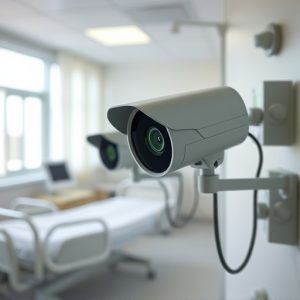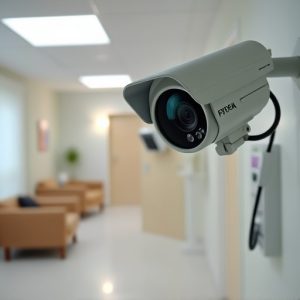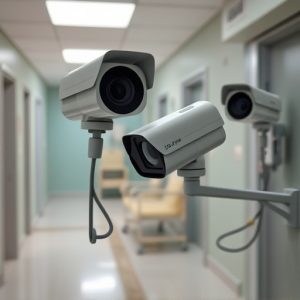Advancing Elderly Care with Smart Camera Systems: Balancing Safety and Privacy
Advanced camera systems equipped with intelligent software are transforming elderly care monitoring…….
Advanced camera systems equipped with intelligent software are transforming elderly care monitoring in nursing homes by enhancing resident safety and quality of care. These technologies prioritize privacy and dignity, employing non-invasive methods to discreetly monitor residents' activities while ensuring their comfort and autonomy. They are designed to detect potential health risks such as falls or immobility, enabling prompt interventions by care staff and improving response times to medical emergencies. The data collected supports the development of personalized care plans, optimizes daily routines, and refines care practices, all contributing to efficient and effective care delivery. Ethical deployment of these cameras necessitates clear policies on their use, which must respect resident confidentiality and autonomy, ensuring they are used with full consent and without infringing upon privacy. The integration of camera systems in nursing homes exemplifies a commitment to leveraging technology for the highest standards of elderly care while emphasizing ethical practices and maintaining trust through transparency. As these technologies advance, the focus remains on balancing surveillance with respect for resident autonomy and privacy, predicting an evolution towards more sophisticated sensors and machine learning algorithms that will further safeguard residents and enhance their quality of life. Nursing homes are encouraged to navigate this technological landscape carefully, adhering to robust privacy policies and legal compliance, to provide the best care possible.
Title: Navigating the Intersection of Technology and Compassion: The Role of Cameras for Nursing Homes in Elderly Care Monitoring
In recent years, the integration of technology into elderly care has become a pivotal discussion. This article delves into the multifaceted approach of leveraging advanced camera systems within nursing homes to enhance the quality of care. We explore the nuanced balance between technological innovation and ethical boundaries, particularly focusing on privacy concerns. Through a detailed examination of camera-based systems’ effectiveness in ensuring safety and promoting wellbeing, we aim to shed light on the most suitable practices for implementing such technologies in senior living facilities. Furthermore, we will anticipate future trends, offering insights into how cameras can become an integral component of nursing home care without compromising the dignity and privacy of our eldest members of society.
Leveraging Technology for Enhanced Care in Nursing Homes through Advanced Camera Systems
In recent years, the integration of advanced camera systems within nursing homes has emerged as a transformative approach to elderly care monitoring, offering a new dimension in enhanced resident care and safety. These sophisticated cameras are designed with privacy and dignity at their core, utilizing discreet, non-invasive technology that provides real-time data on residents’ activities and well-being without compromising their comfort or autonomy. The footage captured by these cameras is analyzed through intelligent software algorithms that can detect anomalies such as falls, immobility, and potential health issues, enabling timely interventions by care staff to address any concerns promptly. This proactive approach not only supports the health and safety of residents but also reduces the burden on healthcare workers by streamlining their tasks through actionable insights provided by the camera systems. By leveraging cameras for nursing homes, facilities can offer a higher standard of personalized care while ensuring that residents receive the attention and support they need to maintain their quality of life in a secure environment.
Furthermore, these camera systems are equipped with features that allow for the monitoring of residents’ routines and behaviors over time, which is invaluable for creating individualized care plans tailored to each resident’s unique needs. The data collected by these cameras can inform staff about the best times for interaction, meals, medication administration, and personal activities, leading to more efficient and effective care delivery. Additionally, the use of cameras for nursing homes facilitates a continuous improvement process, as facility managers can analyze the data collected to identify areas where care practices can be optimized. This commitment to innovation and excellence in elderly care monitoring through technology underscores a dedication to providing the highest level of support for aging individuals in a residential care setting.
The Ethical Considerations and Privacy Concerns of Using Cameras in Elderly Care Monitoring
In recent years, the integration of technology in elderly care has become increasingly sophisticated, with cameras for nursing homes being one such innovation. While these cameras can provide caregivers with real-time insights into the wellbeing of residents, they also raise significant ethical considerations and privacy concerns. It is imperative to strike a balance between ensuring the safety and health of seniors and respecting their right to privacy and autonomy. The deployment of cameras must be governed by strict policies that outline when, where, and how footage can be recorded and accessed. These guidelines protect residents from any form of exploitation or intrusion and ensure that data is handled with the utmost confidentiality. Moreover, consent is a cornerstone of ethical practice; elderly individuals or their legal representatives must provide informed consent, understanding the scope and limitations of camera surveillance within the facility. Transparent communication about the monitoring system’s purpose and operation is crucial to maintaining trust and ensuring that the technology serves as an aid rather than an invasion of personal space. The ethical use of cameras for nursing homes demands a commitment to privacy, security, and respect for the dignity of the elderly population they are intended to serve.
Evaluating the Effectiveness of Camera-Based Systems for Safety and Wellbeing in Senior Living Facilities
In recent years, camera-based systems have emerged as a tool for enhancing safety and wellbeing in senior living facilities, otherwise known as nursing homes. These systems can provide real-time monitoring of residents, enabling caregivers to respond promptly to incidents or emergencies. The effectiveness of such technology hinges on its ability to maintain privacy while offering comprehensive coverage. Nursing homes exploring cameras for nursing homes should consider the balance between surveillance and respect for resident autonomy. High-definition cameras with motion detection can alert staff to falls, medical events, or other situations requiring immediate attention. Moreover, these systems can be equipped with advanced analytics to detect unusual behavior patterns that may indicate a decline in health or an emerging safety concern. The integration of camera-based monitoring should be coupled with clear privacy policies and robust data protection measures to ensure residents’ dignity is upheld.
Furthermore, the deployment of cameras for nursing homes must adhere to strict regulations and ethical guidelines. It is crucial that such systems are only used to support resident care and not for invasive or unauthorized purposes. The technology should be transparent in its operations, with clear signage indicating surveillance is in place, and policies outlining data usage and access. By ensuring the privacy and security of residents, camera-based systems can become a valuable asset in the daily operation of nursing homes, offering peace of mind to both residents and their families while fostering a safer living environment. It is through careful implementation and ongoing evaluation that these systems can truly enhance the quality of care provided within senior living facilities.
Implementing Cameras for Nursing Homes: Best Practices, Technology Solutions, and Future Trends in Elderly Care Monitoring
In recent years, the integration of cameras for nursing homes has become a topic of significant interest within the realm of elderly care monitoring. As technology advances, these systems offer a non-invasive method to ensure the safety and well-being of residents. Best practices for implementing such technologies emphasize privacy, security, and ethical considerations. Nursing homes should develop clear policies that outline when and how camera footage is used, ensuring compliance with local laws and regulations while maintaining resident dignity. Technologies such as motion-activated cameras can provide real-time alerts to staff, allowing for timely responses to incidents. Additionally, advancements in AI-driven analytics enable the detection of unusual activities or changes in a resident’s behavior patterns, which can be critical for proactive healthcare interventions. The future trends in elderly care monitoring are poised to integrate more sophisticated sensors and machine learning algorithms that can not only enhance safety but also enrich the quality of life for seniors by offering personalized care experiences. These innovations promise a balance between maintaining autonomy for residents and providing peace of mind for families, all while respecting individual privacy and rights. As the technology continues to evolve, it is imperative that nursing homes remain at the forefront of these advancements, ensuring ethical use of cameras in elderly care monitoring systems.


